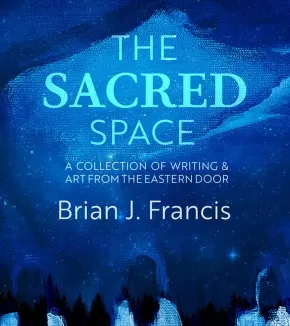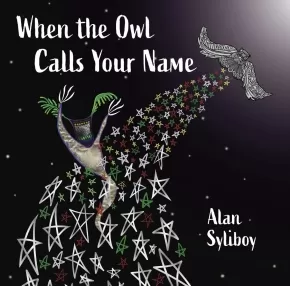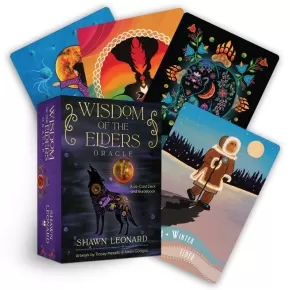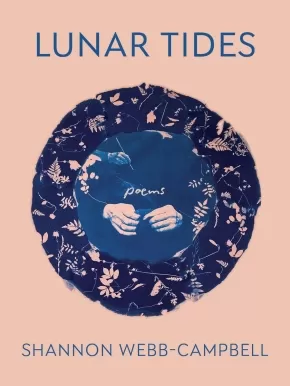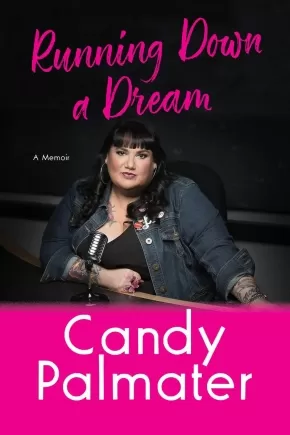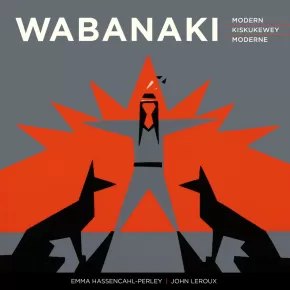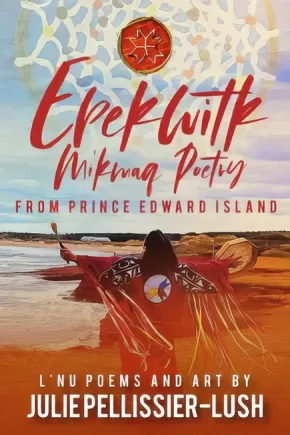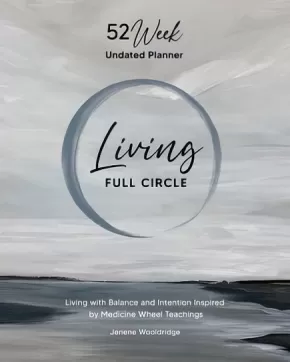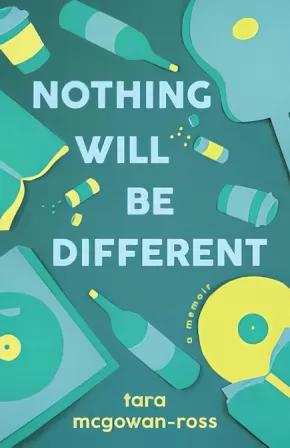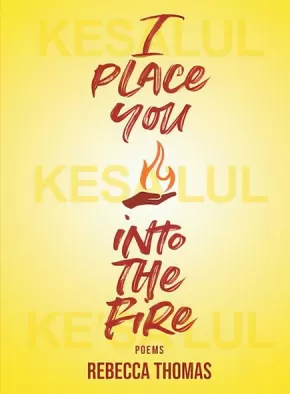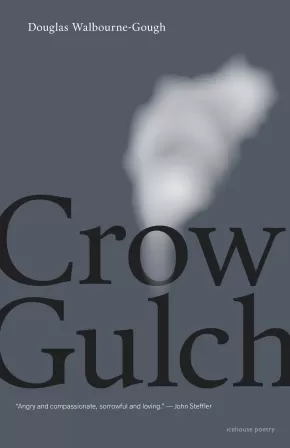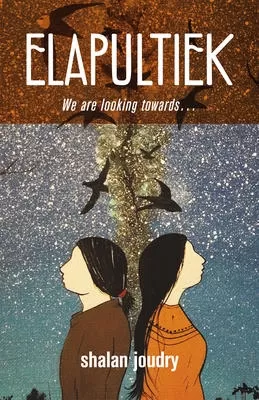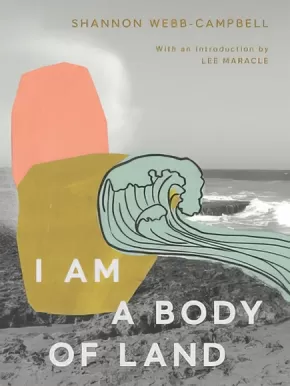
Mi'kmaq (Mi'gmaq)
16
-
30
of
39 Results;
Sort By
Go To
of 3
The Sacred Space: A Collection of Writing & Art from the Eastern Door
$25.95
Format:
Hardcover
Text Content Territories:
Indigenous Canadian; First Nations; Mi'kmaq; Elsipogtog First Nation;
Reading Level: N/A
ISBN / Barcode: 9781773661230
Synopsis:
Synopsis:
In this intimate collection of writing and art, Brian J. Francis invites us to explore the sacred space within. Through vision, prayer, and dream work, Francis channels messages from the ancestors to help us contemplate themes of nature, mortality, truth, and reconciliation. Eclipsing space and time, Francis words and art resonate with deep texture, hope, colour, and mastery. The result is a shimmering testament to his Mi'kmaq ancestors, and a pledge to the next generation. Guiding us beyond spirit and nation boundaries, this eloquent read is ideal for anyone seeking sanctuary, sacred space, and a comfortable seat at their own altar.
Additional Information
88 pages | 8.00" x 8.00" | Hardcover
When the Owl Calls Your Name
$22.95
Artists:
Format:
Hardcover
Text Content Territories:
Indigenous Canadian; First Nations; Mi'kmaq;
ISBN / Barcode: 9781774712467
Synopsis:
Synopsis:
"The Owl Song" by Alan Syliboy & the Thundermakers is now a gorgeously illustrated book for all ages, exploring Mi'kmaw spirituality, life and death.
They say when the Owl calls your name
that the Creator is calling you home.
And when the owl comes to you,
he sits and waits until your final breath.
Then your journey begins.
From bestselling author Alan Syliboy (Mi'kmaw Daily Drum, Wolverine and Little Thunder, The Thundermaker) comes a beautiful new book exploring spirituality, mortality and grieving. An illustrated extended version of his popular song "The Owl Song," it features imagery inspired by his band Alan Syliboy & The Thundermakers' performance material and an author's note on Mi'kmaw tradition and Syliboy's own personal experiences with death. This book for all ages is a poignant depiction of what might happen when the Owl calls your name, and you begin your journey home to the ancestors.
Educator Information
The publisher recommends this picture book for all ages.
Subjects: death, grief, afterlife, spiritual, Mi'kmaw tradition
Additional Information
32 pages | 8.00" x 8.00" | Hardcover
Wisdom of the Elders Oracle: A 44-Card Deck and Guidebook
$28.99
Artists:
Text Content Territories:
Indigenous American; Native American; Mi'kmaq;
Reading Level: N/A
ISBN / Barcode: 9781401971755
Synopsis:
Synopsis:
A 44-card oracle deck focusing on the teachings, traditions, and wisdom of the Mi’kmaq people, meant to help the reader create a deeper connection with the spirit world and Mother Earth.
Indigenous wisdom is sacred and has been shared for many generations by the Elders of the spirit world, and it is through their wisdom that we bridge the physical world to the spirit world. When you use these oracle cards you are walking in the world with the wisdom of the Elders. These teachings were meant to be shared with you, and to help you through your daily and spiritual life.
This deck is a tool meant to support you on your journey through life; the purpose of sharing these teachings is to help you grow and develop spiritually, within your own personal connection to Spirit, and to your loved ones on the other side.
The cards include—but are not limited to—teachings and concepts like:
Indigenous wisdom is sacred and has been shared for many generations by the Elders of the spirit world, and it is through their wisdom that we bridge the physical world to the spirit world. When you use these oracle cards you are walking in the world with the wisdom of the Elders. These teachings were meant to be shared with you, and to help you through your daily and spiritual life.
This deck is a tool meant to support you on your journey through life; the purpose of sharing these teachings is to help you grow and develop spiritually, within your own personal connection to Spirit, and to your loved ones on the other side.
The cards include—but are not limited to—teachings and concepts like:
- the Seven Grandfather Teachings
- the Four Sacred Fire Teachings
- the Four Sacred Medicines
- the Milky Way
- Talking Circle
- Two-Spirit
- Spirit Totem Animal
- Power Totem Animal
- Wigwam.
Additional Information
120 pages | 3.94" x 5.44" | 44-Card Deck and Guidebook
Lunar Tides
$20.00
Format:
Paperback
Text Content Territories:
Indigenous Canadian; First Nations; Mi'kmaq;
Reading Level: N/A
ISBN / Barcode: 9781771667388
Synopsis:
Synopsis:
Expansive and enveloping, Webb-Campbell's collection asks, "Who am I in relation to the moon?" These poems explore the primordial connections between love, grief, and water, structured within the lunar calendar.
The poetics follow rhythms of the body, the tides, the moon, and long, deep familial relationships that are both personal and ancestral. Originating from Webb-Campbell's deep grief of losing her mother, Lunar Tides charts the arc to finding her again in the waves. Written from a mixed Mi'kmaq/settler perspective, this work also explores the legacies of colonialism, kinship and Indigenous resurgence.
Lunar Tides is the ocean floor and a moonlit night: full of possibility and fundamental connections.
Reviews
"Lunar Tides, Shannon Webb-Campbell exposes a heart that's broken but also carried across the gulf between the moon and the sea, a heart that knows how "grief takes up with the body." She shows us that grief is tidal, its ebb and flow pulsing like the moon and dog-earring our memories. This book reminds us that, grieving or not, we "need to be held by something other than a theory." —Douglas Walbourne-Gough, author of Crow Gulch
Additional Information
128 pages | 6.00" x 8.00" | Paperback
Righting Canada's Wrongs: The Sixties Scoop and the Stolen Lives of Indigenous Children
$34.95
Format:
Hardcover
Text Content Territories:
Indigenous Canadian;
ISBN / Barcode: 9781459416697
Synopsis:
Synopsis:
This book for students examines a child welfare policy in Canada that began in 1951 in which Indigenous children were taken from their homes and put into the care of non-Indigenous families. These children grew up without their birth families, cultural roots and language. Many tried to run away and some died in the attempt. The taking of the children became known as the Sixties Scoop. The term “Sixties Scoop” makes explicit reference to the 1960s, but the policies and practices started before the 1960s and lasted long after. Today, Indigenous children are over-represented in the Child Welfare System across Canada in shocking numbers.
Indigenous communities got organized and fought back for their children. In 1985, the Kimelman Report was released, condemning the practice of adopting Indigenous children into non-Indigenous families and for taking so many children out of their communities.
In the 1990s, lawsuits were filed against the governments who had supported taking the children. In 2018 and 2019, Alberta, Saskatchewan and Manitoba apologized for their roles in supporting the adoption programs. In 2020, the Canadian government agreed to a settlement for survivors of the Scoop.
Through hundreds of photos and primary documents, readers will meet many survivors of the Scoop. They’ll also learn how Indigenous communities fought back to save their children and won, and how Indigenous communities across Canada are working towards healing today.
Educator & Series Information
This book is part of the Righting Canada's Wrongs series.
Recommended for ages 13 to 18.
This book is available in French: La rafle des années 1960: et enfance volée aux jeunes Autochtones.
Additional Information
104 pages | 9.01" x 11.02" | 300 Photographs | Hardcover
Running Down a Dream: A Memoir
$32.99
Format:
Hardcover
Text Content Territories:
Indigenous Canadian; First Nations; Mi'kmaq;
Reading Level: N/A
ISBN / Barcode: 9781443455091
Synopsis:
Synopsis:
A powerful, often funny, always inspiring memoir from a beloved comedian, professional orator, actor, entertainer, gone all too soon.
Candy Palmater loved to connect with people. She lived for the stage, her effervescent presence on television and radio ignited and inspired audiences, touching them with her warm, often spicy humour as well as her positive message about love and kindness. And she always believed that it is never too late to pursue our dreams and that we should never allow others to negatively influence our life’s desires.
Candy described herself as a queer Mi’kmaw lawyer-turned-comic raised by bikers in rural New Brunswick and on the surface, she met with enormous success – on leaving government and the practice of law, she started a career as a stand-up comedian, which led to starring in five successful seasons of her own national TV show, hosting many radio shows and co-guest hosting CTV’s The Social, and landing a recurring role on a hot new sitcom in her fifties. But she is the first to tell you she made all kinds of mistakes and experienced all kinds of failure along the way. Running Down a Dream is Candy’s story, in her own words, of the highs, the lows, the moments of doubt, the turning points when she listened to her gut and tuned out all the people saying no. It’s also a tribute to her family and the love that always bolstered her, despite their own hard times. She shares her stories to inspire us to embrace our failures and to believe in ourselves. And most importantly, Running Down a Dream is a call to love ourselves for who we are.
The world lost Candy in late 2021, and yet she left us with this gift -- a memoir and a message that will inspire us for years to come.
Additional Information
304 pages | 6.00" x 9.00" | Hardcover
Wabanaki Modern | Wabanaki Kiskukewey | Wabanaki Moderne
$45.00
Format:
Paperback
Text Content Territories:
Indigenous Canadian; First Nations; Mi'kmaq;
Reading Level: N/A
ISBN / Barcode: 9781773102665
Synopsis:
Synopsis:
The story of an overlooked group of cultural visionaries
The “Micmac Indian Craftsmen” of Elsipogtog (then known as Big Cove) rose to national prominence in the early 1960s. At their peak, they were featured in print media from coast to coast, their work was included in books and exhibitions — including at Expo 67 — and their designs were featured on prints, silkscreened notecards, jewelry, tapestries, and even English porcelain.
Primarily self-taught and deeply rooted in their community, they were among the first modern Indigenous artists in Atlantic Canada. Inspired by traditional Wabanaki stories, they produced an eclectic range of handmade objects that were sophisticated, profound, and eloquent.
By 1966, the withdrawal of government support compromised the Craftsmen's resources, production soon ceased, and their work faded from memory. Now, for the first time, the story of this groundbreaking co-operative and their art is told in full. Accompanying a major exhibition at the Beaverbrook Art Gallery opening in 2022, Wabanaki Modern features essays on the history of this vibrant art workshop, archival photographs of the artisans, and stunning full-colour images of their art.
Wla atukuaqn na ujit ta'nik mu ewi'tamuki'k tetuji kelulkɨpp ta'n teli amaliteka'tijik
Wla “Mi'kmewaqq L'nue'k amaliteka'tijik” tlo'ltijik Elsipogtog (amskweseweyekk i'tlui'tasikɨpp Big Cove) poqji wuli nenupnikk wla amaliteka'tijik 1960ekk. Je wekaw wutlukowaqnmuwow ika'tasikɨpp wikatikniktuk aqq ne'yo'tasikɨpp ta'n pukwelk ta'n wen nmitew — je wekaw Expo 67 — aqq ta'n koqoey kisi napui'kmi'tipp tampasɨk koqoey eweketu'tij stike' l'taqnewi'kasik, napui'kn misekn, wi'katikne'ji'jk, meko'tikl kuntal, kaqapitkl l'taqa'teke'l, aqq wekaw akalasie'we'k eptaqnk. Nekmow na kekina'masultijik aqq melki knukwi'tij ta'n tett telayawultijik, nekmow na amskewsewa'jewaqq l'nu'k tel nenujik ujit ta'n teli amaliteka'tijik ujit Atlantic Canada. Pema'lkwi'titl a'tukuaqnn ta'n sa'qewe'l, ta'n wejiaqel a'tukuaqnn Wabanaki, l'tu'tipp kaqasi milamu'k koqowey toqo eweketu'titl wutpitnual tetuji moqɨtekl, ma'muntekl, aqq weltekl.
Wekaw 1966ekk, kpno'l pun apoqnmuapni wla amaliteka'tikete'jɨk jel kaqnma'tijik ta'n koqoey nuta'tipp, amuj pana pun lukutipnikk, aqq tel awantasuwalutki'k. Nike', amskwesewey, wla a'tukuaqn tetuji msɨki'kɨpp wla wut lukewaqnmuwow etel kaqi a'tukwasikk. Wije'tew meski'k neya'tmk Beaverbrook Art Gallery pana'siktetew 2022al, Wabanaki Modern na pema'toql wikikaqnn ujit ta'n pemiaqɨpp wla tetuji wulamu'kɨpp kisitaqnne'l telukutijik, maskutekl sa'qewe'l napuikasikl toqo nemu'jik etl-lukutijik wla lukewinu'k, aqq sikte wultek aqq welamu'k ta'n koqoey kisitu'tij.
L'histoire d'un groupe de visionnaires culturels ignorés
Un groupe d'artisans mi'kmaw d'Elsipogtog (autrefois Big Cove) au Nouveau-Brunswick se fit connaître à travers le Canada au début des années 1960. À l'apogée de leur renommée, les Micmac Indian Craftsmen firent l'objet d'articles dans des publications d'un océan à l'autre. Leur travail figura dans des livres et des expositions — dont Expo 67 à Montréal — et leurs œuvres graphiques furent reproduites sous forme de gravures et de sérigraphies, et elles ornèrent de la papeterie, des bijoux, des tapisseries et même de la porcelaine anglaise.
En grande partie autodidactes et solidement enracinés dans leur communauté, les Micmac Indian Craftsmen furent parmi les premiers artistes autochtones modernes au Canada atlantique. En s'inspirant de récits traditionnels wabanakis, ils fabriquaient à la main une gamme variée d'objets raffinés, évocateurs et porteurs d'un sens profond.
En 1966, toutefois, le gouvernement retira son soutien. Les Craftsmen perdirent leur financement, la production cessa peu après et leur œuvre finit par être oubliée. Une nouvelle publication relate maintenant, pour la première fois, l'histoire complète de cette coopérative innovatrice et de ses réalisations. Publié dans le cadre d'une grande exposition qui a lieu à la Galerie d'art Beaverbrook en 2022, Wabanaki Moderne comprend des textes sur l'histoire de cet atelier dynamique, des photographies d'archives des artisans et de superbes illustrations couleur de leurs œuvres.
Educator Information
Delivered in three languages: English, Mi'kmaw, and French
Additional Information
228 pages | 10.00" x 10.00" | Paperback | 96 Colour Reproductions and Photos, 26 Black and White Illustrations and Archival Photos
Epekwitk: Mi'kmaq Poetry from Prince Edward Island
$24.95
Format:
Paperback
Text Content Territories:
Indigenous Canadian; First Nations; Mi'kmaq;
Reading Level: N/A
ISBN / Barcode: 9781773660851
Synopsis:
Synopsis:
The highly anticipated debut poetry collection of Mi'kmaq poems by Prince Edward Island's Poet Laureate, Julie Pellisier-Lush.
This collection will enthrall poetry lovers. Skilled at taking words from hearts and minds to paper, Julie's poems will connect with the reader deeply. Some poems were created with teachings from our Elders and some were created to learn more about the art of words.
At times heart wrenching and other times a call to action for Mother Earth, each poignant poem is paired with vivid artwork crafted by the poet herself.
Take what you like, use what you need, most of all enjoy.
Additional Information
96 pages | 5.50" x 9.00" | Paperback
Living Full Circle: Living with Balance and Intention Inspired by Medicine Wheel Teachings
$29.95
Format:
Hardcover
Text Content Territories:
Indigenous Canadian;
Reading Level: N/A
ISBN / Barcode: 9781773660936
Synopsis:
Synopsis:
PLAN YOUR YEAR WITH THE LIVING FULL CIRCLE PLANNER. In this planner, author Jenene Wooldridge shares her insights and personal experience on how she incorporates teachings of the medicine wheel around balance and living with purpose to live her life and achieve success. She shares the importance of contemplation, preparation, goals and how they connect to Living Full Circle.
Discover what works for you, develop healthy habits and create goals with intention to live your best. With twelve themed months and 52 weeks of guided reflection, this planner provides a foundation for your ideal life. Track your progress and learn from its useful tips and inspiration as you grow.
• Created by you, for you!
• Delivers clarity for daily living
• Guided reflection to increase self-awareness and productivity
• Goal setting, habit tracking and intentional living
Educator Information
52 Week Undated Planner
Additional Information
160 pages | 8.00" x 10.00"
My Indian
$16.95
Format:
Paperback
Text Content Territories:
Indigenous Canadian; First Nations; Beothuk; Mi'kmaq;
ISBN / Barcode: 9781550818789
Synopsis:
Synopsis:
In 1822, William Epps Cormack sought the expertise of a guide who could lead him across Newfoundland in search of the last remaining Beothuk camps on the island. In his journals, Cormack refers to his guide only as “My Indian.”
Now, almost two hundred years later, Mi’sel Joe and Sheila O’Neill reclaim the story of Sylvester Joe, the Mi’kmaq guide engaged by Cormack. In a remarkable feat of historical fiction, My Indian follows Sylvester Joe from his birth (in what is now known as Miawpukek First Nation) and early life in his community to his journey across the island with Cormack. But will Sylvester Joe lead Cormack to the Beothuk, or will he protect the Beothuk and lead his colonial explorer away?
In rewriting the narrative of Cormack’s journey from the perspective of his Mi’kmaq guide, My Indian reclaims Sylvester Joe’s identity.
Educator & Series Information
Recommended for ages 12 to 14.
Recommended for ages 12 to 14.
This is the first book in the My Indian series.
Additional Information
176 pages | 5.25" x 8.00" | b&w illustrations
176 pages | 5.25" x 8.00" | b&w illustrations
Nothing Will Be Different: A Memoir
$21.99
Format:
Paperback
Text Content Territories:
Indigenous Canadian; First Nations; Mi'kmaq;
Reading Level: N/A
ISBN / Barcode: 9781459748736
Synopsis:
Synopsis:
A neurotic party girl's coming-of-age memoir about learning to live before getting ready to die.
Tara has it pretty good: a nice job, a writing career, a forgiving boyfriend. She should be happy. Yet Tara can’t stay sober. She’s terrible at monogamy. Even her psychiatrist grows sick of her and stops returning her calls. She spends most of her time putting out social fires, barely pulling things off, and feeling sick and tired.
Then, in the autumn following her twenty-seventh birthday, an abnormal lump discovered in her left breast serves as the catalyst for a journey of rigorous self-questioning. Waiting on a diagnosis, she begins an intellectual assessment of her life, desperate to justify a short existence full of dumb choices. Armed with her philosophy degree and angry determination, she attacks each issue in her life as the days creep by and winds up writing a searingly honest memoir about learning to live before getting ready to die.
Reviews
"This delightful book, appropriately enough, works like your favourite mixtape. It's got everything you want, and somehow it all fits. The arrangement is unexpected but, in retrospect, seems obviously right. Here is softness and pain, intimacy and revulsion, flourishing and sickness. And McGowan-Ross just sounds so good." — Sasha Chapin, author of All The Wrong Moves
"Tara McGowan-Ross is an unpretentious poet and philosopher weaving together meaning from the pain, grief, heartache, as well as simple joy of being alive. Nothing Will Be Different is a meditation on amor fati: the love of fate, the love of what is. By being with all of it: trauma, profound loss, the reality of death, addiction, precarity, the gig economy, hard work, love both dizzying and secure, sex, and insatiable desire, Tara shows us that transformation comes not through a battle against what is, but from the willingness to be changed by it." — Clementine Morrigan, author of Love Without Emergency
Additional Information
240 pages | 5.50" x 8.50"
I Place You into the Fire
$18.95
Format:
Paperback
Text Content Territories:
Indigenous Canadian; First Nations; Mi'kmaq;
Grade Levels: 12; University/College;
ISBN / Barcode: 9781771088855
Synopsis:
Synopsis:
The incisive and vital first poetry collection from Mi'kmaw spoken-word poet and former poet laureate of Kjipuktuk (Halifax), Nova Scotia.
We remember tomorrow and a thousand years ago.
From eel weirs to the buffalo.
We remember petroglyphs and Instagram photos.
See, we remember our history,
Without statues, money, or pictures of the Queen.
In Mi'kmaw, three similarly shaped words have drastically different meanings: kesalul means "I love you"; kesa'lul means "I hurt you"; and ke'sa'lul means "I put you into the fire." In spoken-word artist and critically acclaimed author (I'm Finding My Talk) Rebecca Thomas's first poetry collection, readers will feel Thomas's deep love, pain, and frustration as she holds us all to task, along the way mourning the loss of her childhood magic, exploring the realities of growing up off reserve, and offering up a new Creation Story for Canada.
Diverse and probing, I place you into the fire is at once a meditation on navigating life and love as a second-generation Residential School survivor, a lesson in unlearning, and a rallying cry for Indigenous justice, empathy, and equality. A searing collection that embodies the vitality and ferocity of spoken-word poetry.
Additional Information
128 pages | 5.50" x 7.50"
Crow Gulch
$19.95
Format:
Paperback
Text Content Territories:
Indigenous Canadian; First Nations; Mi'kmaq;
Grade Levels: 12; University/College;
ISBN / Barcode: 9781773101019
Synopsis:
Synopsis:
From the author: I cannot let the story of Crow Gulch — the story of my family and, subsequently, my own story — go untold. This book is my attempt to resurrect dialogue and story, to honour who and where I come from, to remind Corner Brook of the glaring omission in its social history.
"These deeply engaging poems — courageous, shrewdly observed, disillusioned — give sharp, prsonal expression to the harsh-beautiful landscape of western Newfoundland, and the human community precariously, stubbornly rooted there." — John Steffler
In his debut poetry collection, Douglas Walbourne-Gough reflects on the legacy of a community that sat on the shore of the Bay of Islands, less than two kilometres west of downtown Corner Brook.
Crow Gulch began as a temporary shack town to house migrant workers in the 1920s during the construction of the pulp and paper mill. After the mill was complete, some of the residents, many of Indigenous ancestry, settled there permanently — including the poet's great-grandmother Amelia Campbell and her daughter, Ella — and those the locals called the "jackytars," a derogatory epithet used to describe someone of mixed French and Mi'kmaq descent. Many remained there until the late 1970s, when the settlement was forcibly abandoned and largely forgotten.
Walbourne-Gough lyrically sifts through archival memory and family accounts, resurrecting story and conversation, to patch together a history of a people and place. Here he finds his own identity within the legacy of Crow Gulch and reminds those who have forgotten of a glaring omission in history.
Reviews
"These deeply engaging poems — courageous, shrewdly observed, disillusioned — give sharp, personal expression to the harsh-beautiful landscape of western Newfoundland and the human community precariously, stubbornly rooted there. A sense of conflict drives through this work, a reflection of the traditional struggle to gain a living from the sea and rocky land but also a raw exploration of the conflict between poverty and privilege, honesty and propriety." — John Steffler, April 2019
"Crow Gulch announces an important poet. The differences Douglas Walbourne-Gough explores between class and ethnicities are as hard as Newfoundland's rock, as shifting as the foundations of a forcibly resettled Crow Gulch. This book is a conversation between a rude landscape, the displaced or dispossessed, and a narrator searching for belonging." — Stephanie McKenzie, April 2019
"Bent low and clund to a coast, Walbourne-Gough lets the land shape him. Brilliant and weathered observation interlaces family and archive to render present and necessary the memory of Crow Gulch. Here is a day's labour, a fretting walk along the tracks, a house 'that lets in snow at the seams,' grandmother's kitchen. Hear still 'her peals of laughter against the far shore and all that lives on in this book.'" — Cecily Nicholson, April 2019
Additional Information
80 pages | 5.50" x 8.50"
Elapultiek (We Are Looking Towards): A Play
$19.95
Format:
Paperback
Text Content Territories:
Indigenous Canadian; First Nations; Mi'kmaq;
Grade Levels: 12; University/College;
ISBN / Barcode: 9781988286662
Synopsis:
Synopsis:
Set in contemporary times, a young Mi'kmaw drum singer and a Euro-Nova Scotian biologist meet at dusk each day to count a population of endangered Chimney Swifts (kaktukopnji'jk). They quickly struggle with their differing views of the world. Through humour and story, the characters must come to terms with their own gifts and challenges as they dedicate efforts to the birds. Each "count night" reveals a deeper complexity of connection to land and history on a personal level.
Inspired by real-life species at risk work, shalan joudry originally wrote this story for an outdoor performance.
Elapultiek calls on all of us to take a step back from our routine lives and question how we may get to understand our past and work better together. The ideal of weaving between Indigenous and non-Indigenous worlds involves taking turns to speak and to listen, even through the most painful of stories, in order for us all to heal. We are in a time when sharing cultural, ecological, and personal stories is vital in working towards a peaceful shared territory, co-existing between peoples and nature.
"It's a crucial time to have these conversations," offers joudry. "The power of story can engage audience and readers in ways that moves them to ask more questions about the past and future."
Additional Information
96 pages | 6.00" x 9.00"
I Am a Body of Land
$18.00
Format:
Paperback
Text Content Territories:
Indigenous Canadian; First Nations; Mi'kmaq;
ISBN / Barcode: 9781771664776
Synopsis:
Synopsis:
I Am a Body of Land by Shannon Webb-Campbell explores poetic responsibility and accountability, and frames poetry as a form of revisioning. In these poems, Webb-Campbell returns to her own text Who Took My Sister?, to examine her self and to decolonize, unlearn, and undo harm. By reconsidering individual poems and letters, Webb-Campbell's confessional writing circles back upon itself to ask questions of her own settler-Indigenous identity and belonging to cry out for community, and call in with love.
With an introduction by multiple award-winning writer and activist Lee Maracle.
Reviews
“Shannon Webb-Campbell’s work forces readers out of polite conversation and into a realm where despair and hard truths are being told, being heard and finding the emotional strength to learn from it, find our way out and embrace our beauty as Indigenous women.”—Carol Rose Daniels, author of Hiraeth and Bearskin Diary, winner of the First Nations Communities READ Award and the Aboriginal Literature Award.
“Poetry awake with the winds from the Four Directions, poetry that crosses borders, margins, treaties, yellow tape warning: Police Line. Do Not Cross. Poetry whose traditional territory, through colonization, has become trauma and shame. Unceded poetry. Read. Respect. Weep.”—Susan Musgrave, author of Origami Dove
Educator Information
Recommended in the Canadian Indigenous Books for Schools 2019-2020 resource list as being useful for grades 10 to 12 in the areas of Media Studies, Social Studies, and English Language Arts.
Additional Information
74 pages | 5.25" x 8.00"
Sort By
Go To
of 3

